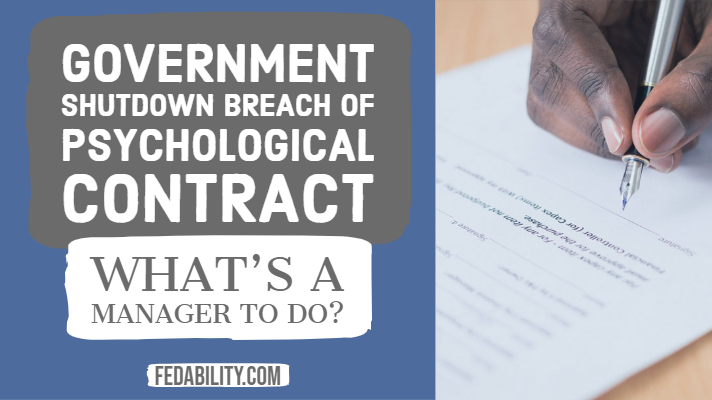Easily one of the top 5 reasons why people choose to work for the federal government is job security. And, up until the 2018 partial shutdown of the federal government, this was a pretty true statement. There’s nothing in writing making this promise of job security. It is just an understood benefit of working for the government in return for their acceptance of some of the more challenging aspects of the political environment. In short, it’s a psychological contract.
As a workforce who values job security begins to see the cracks in the veneer, they are beginning to see their psychological contract is not being upheld. In turn, it’s an opportunity for leaders to step up and care for their employees. And, those leaders who do this well may save their teams when the government reopens. Those who do not may see their best performers seek other opportunities.
As the shutdown stretches on, furloughed employees finding themselves without paychecks. Others are being directed to work without pay. Still other federal employees are watching their agencies ‘count their pennies’ to delay running out of funds to remain open. Still others may (or may not) be worried about Reductions in Force (RIFs) that can occur (but probably won’t) after more than 30 days in furlough status.
The financial impact is unquestionable for employees, businesses, and the government – the final magnitude currently unknown.
However, there is another impact that is going to have a much longer impact is on how federal employees view their employer (i.e., the government). Their morale when they return. And, their loyalty to their positions once (or if) they return.
Why?
Because their psychological contract with the government is broken.
Psychological Contract
A psychological contract is an unwritten, mutual belief of what the employee can expect of their employer. The psychological contract is separate from any formal contract or job description. And, what the employer receives in return. The term is credited to Denise Rousseau (1989). However, it may have been discussed as early as the 1960’s by Argyris. Argyris wrote that in return for foremen supporting a desired culture of autonomy, fair wages, and job security the employees maintained high production and low grievances.
The psychological contract is believed to evolve over time. From the recruitment period and onboarding and throughout their tenure.
In short, the psychological contract speaks to how the employee is treated or their working conditions, and what the employee gives in return (production, loyalty). In other words, their obligations to each other.
Shutdown as broken psychological contract
There are many things a federal employee accepts as a function of working for the government. Things like more bureaucracy, slower acceptance of change, and lower pay than other employers. In return for that, federal employees can trust that their jobs will be there tomorrow and the next day. They don’t have to worry about stakeholders being unhappy, or a product losing marketshare.
As an example, in 2009 I worked on a multi-billion dollar program that was shut down as President Obama took office. Although the program was eliminated, not once did I worry that my job was at risk. I knew that I’d just be assigned to a new program. And, I was.
This was especially important to me as I’d taken that government job after being laid off from a small consulting company closed their doors. I was given about 5 hours notice to clear out my desk. And, then I was unemployed with house and car payments, utility bills, etc.
I was devastated. I didn’t know the company was in trouble. Given the kind of work that the company did, I hadn’t expected that they’d just shut the doors with no notice.
So, job stability. It was super important to me.
Now, as the government has partially shut down, job stability has come into the cross hairs. Slowly, self-funded agencies are facing shut downs like dominoes as the shut down continues.
For me, like many others, this is a breach in what I thought was our psychological contract with the government. Sure, there’s been a number of shut downs during my tenure with the government. But it’s never been so long and with no end in sight.
Ok, the psychological contract is breached. So what?
Research shows that employees who perceive their psychological contract has been breached experience a range of possible negative emotions. Anger, frustration, disappointment, emotional exhaustion. They may begin engaging in counterproductive behaviors.
You see, if it is perceived the organization is not holding up their side of the ‘deal’, then why should the employee? They may be less productive, withhold new ideas, or intend to turnover. For some, it goes even further into cynicism, theft (e.g., over reporting hours worked), or misuse of resources (e.g., using copiers for printing resumes).
Repairing the psychological contract of federal employees: What’s a manager to do?
The greatest challenge for you as a manager is that you have no control over whether the government reopens. Neither do you control who is considered essential, and whom is sent home. You also can’t ensure that paychecks will be sent out to those who are required to work.
And, heck, you are experiencing the same breach of psychological contract as your employees.
Worse, is you will be living with the consequences if and when your employees ultimately return.
So, what can you do?
Show you care
Part of what is so painful during the current shutdown is that the consequences for employees (e.g., no income) seems like it is being ignored by those are thought to have control over the reopening.
Why not give your employees a call? On your personal phone (since you can’t use work phones). Ask them how they’re doing. See if there’s anything they need.
Help their career
If you aren’t already connected, why not link to them through LinkedIn?
In a prior shutdown article, I suggested that you use this time to create, update, or expand your own LinkedIn account. Now, why not add a recommendation to your employee’s accounts? Not only will it feel nice for them to see a complimentary email/recommendation, it will help them out if they do decided to begin looking for another job.
Suggest a non-work related meetup
When I was laid off 10 years ago, I’d meet up with one of my coworkers at least once a week to go running together. What most don’t realize is it can be very lonely when you get sent home. Most people’s social circle comes from coworkers – and that goes away when the government is shuttered.
So, keep it simple. Keep it cheap. Stay local. Perhaps coffee? An afternoon matinee? Or, go for a run with them. You know your people – what would they like to do? (sadly, you can’t do the usual free stuff of going to a Smithsonian museum at the moment.)
Create a list of resources
There’s a number of offerings in the local tri-state area for food, social services, and the like. There’s also a ton of ‘deals’ from local business that are offering free drinks and food. Some vets are even offering discounts and deferred payments for emergency services. Depending on your employee, they might also find this opportunity to be a bartender with shut-down themed drinks entertaining.
Is this above and beyond to put together a list of resources? Absolutely. But, you are going to be working with a team of people when you return who may be demoralized as a result of their breached psychological contract. Sure, some will be grateful to get back to work. But others will have their eye on the door (at best), or take out their frustration by working a little less efficiently.
By taking the time to check in on your employees, show you care, and help their career, you will begin to mend that broken contract. And, your employees will be grateful to you for being human.





